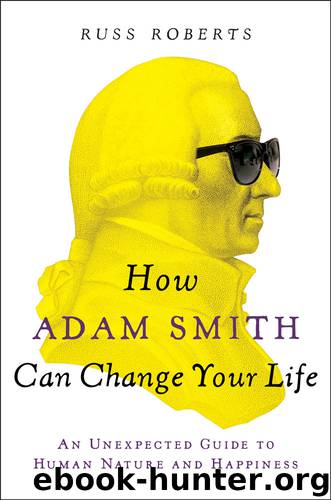How Adam Smith Can Change Your Life by Russ Roberts

Author:Russ Roberts
Language: eng
Format: epub
Publisher: Penguin Group, USA
Published: 2014-09-28T16:00:00+00:00
We have enough troubles of our own. Taking on the suffering of others in full measure would be too hard. Our ability to sympathize with others is limited. But that limited amount is enough to bring them consolation.
A few days before I wrote this chapter, a good friend told me that a beloved cousin of his was dying. They were very close, and the cousin was one of the last members of that generation whom he knew well. I could tell how sad my friend was, and I sympathized with his sadness. I’m sure my face was solemn. I put my hand on his shoulder and told him how bad I felt for him. I asked him to keep me posted on his cousin’s health. I was truly sad for my friend. I felt some of his pain, but not enough to bring down my spirits for more than the briefest time. I was sad for him, but not actually sad. Just as Smith suggests, I quickly forgot about my friend’s sadness and distress other than to mention it to my wife. A few weeks earlier, the same friend had had a great success that he shared with me. I was happy for him. In that case, his success actually put me in a good mood. I wasn’t just happy for him. I was happy, period.
This asymmetry of joy and sorrow—the ease with which we sympathize with success relative to failure—is Smith’s explanation for why the rich and famous receive more attention and create more happiness than the poor and forgotten. We enjoy the successes of the rich and famous. The poor and forgotten move us briefly and not deeply. For Smith, this explains why rich people flaunt their wealth and poor people hide what they are missing:
It is because mankind are disposed to sympathize more entirely with our joy than with our sorrow, that we make parade of our riches, and conceal our poverty. Nothing is so mortifying as to be obliged to expose our distress to the view of the public, and to feel, that though our situation is open to the eyes of all mankind, no mortal conceives for us the half of what we suffer. Nay, it is chiefly from this regard to the sentiments of mankind, that we pursue riches and avoid poverty.
Smith’s observations on how we interact with others in grief and in joy are mainly about how we are made—the nature of human nature—and not so much about how we should behave. He is saying that there are fundamental differences in how we can sympathize with those around us. There are limits to sympathy as we go from experiencing the emotions of close friends compared with those of strangers. We don’t experience great grief the same way we experience great joy. The joy of others can make us happy, as long as we are not envious. The grief of others has a much more limited effect, even for close friends.
How do these lessons translate into propriety? We all differ in how well we process social signals.
Download
This site does not store any files on its server. We only index and link to content provided by other sites. Please contact the content providers to delete copyright contents if any and email us, we'll remove relevant links or contents immediately.
International Integration of the Brazilian Economy by Elias C. Grivoyannis(111061)
The Radium Girls by Kate Moore(12029)
Turbulence by E. J. Noyes(8051)
Nudge - Improving Decisions about Health, Wealth, and Happiness by Thaler Sunstein(7709)
The Black Swan by Nassim Nicholas Taleb(7130)
Rich Dad Poor Dad by Robert T. Kiyosaki(6633)
Pioneering Portfolio Management by David F. Swensen(6301)
Man-made Catastrophes and Risk Information Concealment by Dmitry Chernov & Didier Sornette(6019)
Zero to One by Peter Thiel(5802)
Secrecy World by Jake Bernstein(4753)
Millionaire: The Philanderer, Gambler, and Duelist Who Invented Modern Finance by Janet Gleeson(4478)
The Age of Surveillance Capitalism by Shoshana Zuboff(4293)
Skin in the Game by Nassim Nicholas Taleb(4250)
The Money Culture by Michael Lewis(4207)
Bullshit Jobs by David Graeber(4192)
Skin in the Game: Hidden Asymmetries in Daily Life by Nassim Nicholas Taleb(4007)
The Dhandho Investor by Mohnish Pabrai(3766)
The Wisdom of Finance by Mihir Desai(3748)
Blockchain Basics by Daniel Drescher(3583)
